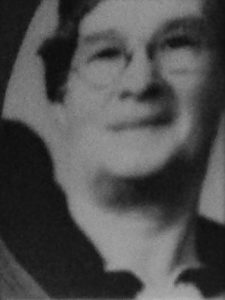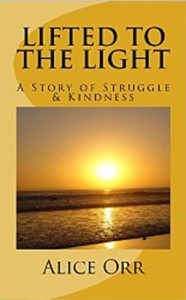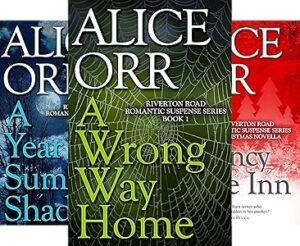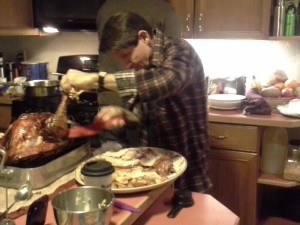Mittens. “We’re here to make the world a better place,” my grandma, Alice Jane Rowland Boudiette, would say.

She made this statement of her personal truth so many times that it became my own truth and would influence my choices throughout all of my life to come. It affected me even more deeply because Grandma didn’t only say those words, she lived them. The Mittens were just one proof of that.
All year long, Grandma collected old knitwear. She was especially partial to sweaters because they had so much yarn in them, and gathering yarn was the purpose of her collecting.
She didn’t care what color the sweaters might be or in what state of disrepair. As long as they could be taken apart they were good enough to go into the bag next to Grandma’s chair and wait for her to unravel them. I was thrilled when she asked me to be part of that.
“Would you like to help, Lovey?”
“Oh, yes.”
“Hold your arms out and bend them up at the elbows,” she said with the small, soft smile she always wore. “Lean on your knees and you won’t get tired.”
I sat on the floor at her feet and did as she instructed. She unraveled the yarn back and forth along the knitted rows of the sweater in her lap, and the garment grew steadily shorter as she wrapped the unraveling yarn round and round my wrists.
“They call this a skein,” she said as the oval grew fatter.
When Grandma came to a break in the yarn, she tied it to the beginning of another piece from a different garment. One color linked to the next color in a rainbow of variations around the skein.
Cross-legged on the floor, a child of five or six holding a hank of yarn, I might have been bored if it weren’t for the stories Grandma told.
“Once upon a time,” she would always begin.
I loved her stories. I wish I could remember them now, though I suspect that what I truly loved was the sound of her voice flowing over me, spooling me into the rainbow skein of being with her, bright as the Mittens were sure to be.
We sat like that mostly in the afternoons when she was between having meals to cook. She rocked slowly back and forth in her heavy oak rocker, the wood grain dark and smooth from many years and much use.
At her right side stood an oval table, also oak, with three curved claw feet as heavy as her chair and a lamp on top with a fringe along the edge of the shade.
The windows in the wall behind her were faced in the wrong direction to invite much light so she inclined her head toward the lamp to see more clearly through her rimless glasses.
The space where we sat was between the parlor and the kitchen and narrower than either of those. Grandma called it her sitting room, but it was really only a walk-through. She made it her place all the same.
I never saw anyone sit there but her and, of course, me. I’ve tried to remember the pattern of the rug I sat on but I can’t, though the rest of the space is as clear to me still as if I sat there now and this were Mittens day.
The rug may be less memorable because I didn’t focus on it much. I tilted my head backward instead, just far enough to keep my gaze on Grandma.
I have a number of photographs of her. She looks quite old in all of them, but I now realize she was only in her early sixties in many of those views.
Maybe it was that she wore her hair in a long braid wrapped around her head and this made her appear older than her years, as if she were from a distant time.
More likely it was her history that did the aging – thirteen pregnancies with eight children that survived, plus living with my very difficult grandfather. The stories the family told of Grandma were always about strength and resilience like the story of one of those thirteen births.
“She had six loaves of bread in the oven when she went into labor,” my mother would say in a tone that discouraged contradiction though the number of loaves varied with each telling.
“She delivered the baby then took the bread out of the oven when it was done.”
I’ve given birth myself, and I have trouble believing that story. I think of it as a parable of how my grandmother lived her life. Or, perhaps, these events may have happened exactly as they were passed on in family legend, like I am passing on the Mittens legend here.
Factual or not, the essence was accurate. Grandma was courageous. Grandma endured.
Another story of courage and endurance was the one about how she came to America. When she was only thirteen years old, she emigrated with a group sponsored by Barnardo’s Homes.
Barnardo’s was a British childrens’ charity that transported young people to Australia or Canada from the late nineteenth century to the 1960s, a practice which is now regarded as deeply misguided.
In October 1892, Grandma and her party embarked from Liverpool, England, sailed to Quebec, then travelled to what was called a Distributing Home in Peterboro, Ontario. She was placed with a family from Watertown, New York, and their several children were given into her care.
“Her parents had too many kids to support so they sent her away,” was how my mother explained my grandmother’s departure from her Windsor, England home.
Such arrangements as the one that brought my grandmother to the United States, where she worked off her passage and living expenses for little or no salary, were a form of indentured service, though my mother blanched at the use of such a term.
Grandma might have blanched at it too, unless it were made clear that she did honest work and nothing undignified. She was intent upon the importance of maintaining dignity whatever the circumstances. She reminded me of this often.
“You are as good as anybody and a lot better than most,” she’d say. “Hold your head up high, and do not ever let anybody make you do otherwise.”
None of which diminishes the stark reality of a teenager leaving all that has been familiar to cross an ocean, live among strangers and never return home again as long as she lived. Grandma held her head high all the same.
I remember her that way, standing tall and straight no matter how long she’d been working that day. She was the first thing I ever believed in – the strong, steady presence of Grandma, making everything better simply because she was there.
I could never get enough of sitting at her feet on those blessed afternoons, gazing up at her in a circle of light tinted gold by an ancient linen lampshade.
Skeining the yarn was followed by the knitting. She knitted almost every day I was with her, and in the evenings after I’d left for my parents’ house. She knitted caps and scarves she called mufflers, but I remember the Mittens best.
They were double-thick, and the cuffs reached past my wrists for several inches under my coat sleeves.
I’ve never had such Mittens since, stitched so tight and strong that they were a bulwark against the weather however harsh it might be, just as Grandma was, and remains, a bulwark for me in life.
“Those pairs aren’t for you,” she said to me one day, as I eyed the growing mound in her basket of finished work. “I have yours set aside.”
“Whose are they then,” I asked.
“You will see,” she said with a twinkle in her smile. And, eventually, I did see.
Grandma’s neighborhood on the north side of Watertown had deteriorated considerably since my mother and her brothers and sisters lived there. One by one the houses around Grandma’s were deserted.
The working class families who had owned and occupied those homes for decades moved out. Poorer, renting families moved in. Many of the children of those families were thin, dirty-faced and, as I remember, rowdier than I was allowed to be.
I also remember what happened on the first snowfall day of winter.
I was always excited when the snow arrived, even though snow was commonplace where we lived, so far north in New York State that we were almost to Canada. I was thrilled anyway, gazing through the frosty window at the flakes floating down.
I prayed for those flakes to stick to the ground and clump together into piles and banks where I could jump and play. I was hopping up and down with eagerness to get outside and do that, but Grandma had other priorities.
“Come on, Lovey,” she said. “We have something important to do.”
She helped me put on my snowsuit jacket and pulled the hood up over my head. Then we went through the vestibule and out the door onto the wide front porch.
This was surprising in itself. Nobody in the family ever used the front door. We always came through the back, directly into the warmth and good smells of Grandma’s kitchen, and we exited the same way. Only strangers and salesmen used the front door.
Grandma stopped at the top of the porch steps. She had a heavy sweater over her shoulders, and snow drifted into her coiled gray hair. She carrying the basket of hats and mufflers she’d been knitting all year long. And, of course, the Mittens too.
I stood behind her and watched as boys and girls gathered at the foot of the porch steps. They were dressed in jackets much flimsier than the one I was wearing, and they hung back shyly until Grandma beckoned them up the steps.
“I have something for you,” she said.
She reached into her basket and gave them each in turn a hat and a scarf. Last of all, every child received a pair of the same special Mittens I loved, all thick and warm and knitted in a rainbow of colors from the yarn I had patiently skeined around my wrists.
“There you go, Lovey,” she said as she looped a scarf around the neck of a little girl about my age.
My heart stung to hear my Grandma call someone else by the name I thought to be exclusively my own. She shone her gentle smile on one child after another that morning, and I felt a stab of jealousy every time, as if she might use up her store of smiles and have none left for me.
I didn’t want to share any part of her with anyone else, particularly not with other children. I felt another jab, of shame this time, later in the day when she explained to me what had really been going on out there on the front porch and why.
“We must do whatever we can whenever we can for those who have life less easy than we do,” she said.
She patted me on the head so I would know she didn’t mean this as a scolding, only as a reminder that we were here to make the world a better place, exactly as she always said.
Still, I was just a child, and each year I couldn’t help but experience a flash of envy as I watched her choose the perfect pair of Mittens from her basket to suit each pair of small hands, while the snow drifted down and another fierce North Country winter began.
But my envy was only a flash which soon faded and was gone.
What has endured ever since is enormous pride that she was my Grandma, the memory of standing close at her side in the glow of the good person she taught me I could also be, and the caress of her love as warm and beautiful as her Mittens.
Alice Orr
Alice Orr. Teacher. Storyteller. Former Editor and Literary Agent. Author of 15 novels, 2 novellas, a memoir, and No More Rejections: 50 Secrets to Writing a Manuscript that Sells. Alice blogs for writers and readers at https://www.aliceorrbooks.com.
Alice’s Memoir is titled Lifted to the Light: A Story of Struggle and Kindness. At the beating heart of this moving story a woman fights her own disease disaster. All her life she has taken care of herself. Now she faces an adversary too formidable to battle alone. Available HERE.

Praise for Lifted to the Light: A Story of Struggle and Kindness: “I was lifted. I highly recommend this book as a can’t-put-down roadmap for anyone.” “Very, very well written. Alice Orr is an amazing author.” “Honest, funny, and consoling.” “I have read other books by Ms. Orr and am glad I haven’t missed this one.” “Couldn’t put it down.”
Alice’s Suspense Novel Series – the Riverton Road Romantic Suspense Series. Five intense stories of love and death and intrigue. Available HERE.

Praise for the Riverton Road Romantic Suspense Series. “Romance and suspense at its best.” “I highly recommend this page-turner series.” “Twists and turns, strong characters, suspense and passionate love.” “The writing is exquisite.”
Ask Alice Your Crucial Questions. What are you most eager to know? About Alice and Jonathan’s experience? About telling your own stories? Ask your questions in the Comments section following this post.
http://facebook.com/aliceorrwriter/
http://twitter.com/AliceOrrBooks/
http://goodreads.com/aliceorr/
http://pinterest.com/aliceorrwriter/




